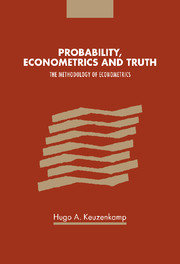Book contents
- Frontmatter
- Contents
- Introduction
- 1 The philosophy of induction
- 2 Probability and indifference
- Intermezzo: a formal scheme of reference
- 3 Relative frequency and induction
- 4 Probability and belief
- 5 The theory of simplicity
- 6 From probability to econometrics
- 7 Econometric modelling
- 8 In search of homogeneity
- 9 Positivism and the aims of econometrics
- 10 Probability, econometrics and truth
- Personalia
- References
- Name Index
- Subject Index
8 - In search of homogeneity
Published online by Cambridge University Press: 22 September 2009
- Frontmatter
- Contents
- Introduction
- 1 The philosophy of induction
- 2 Probability and indifference
- Intermezzo: a formal scheme of reference
- 3 Relative frequency and induction
- 4 Probability and belief
- 5 The theory of simplicity
- 6 From probability to econometrics
- 7 Econometric modelling
- 8 In search of homogeneity
- 9 Positivism and the aims of econometrics
- 10 Probability, econometrics and truth
- Personalia
- References
- Name Index
- Subject Index
Summary
Many writers have held the utility analysis to be an integral and important part of economic theory. Some have even sought to employ its applicability as a test criterion by which economics might be separated from the other social sciences. Nevertheless, I wonder how much economic theory would be changed if either of the two conditions above [homogeneity and symmetry] were found to be empirically untrue. I suspect, very little.
Paul A. Samuelson ([1947] 1983, p. 117)Introduction
After discussing general problems of statistical and econometric inference, I will turn to a case study. This chapter deals with consumer behaviour which belongs to the best researched areas in both economic theory and econometrics.
The theory of consumer behaviour implies a number of properties of demand functions. Such demand functions have been estimated and the predicted properties have been compared with the empirical results. Among the most interesting properties is the homogeneity condition, a widely accepted piece of economic wisdom which, however, does not seem to stand up against empirical tests.
This chapter discusses why the rejections were not interpreted as Popperian falsifications of demand theory. Furthermore, the role of auxiliary assumptions is discussed. Finally, the merits of Leamer's (1978) ‘specification searches’ for interpreting the literature on testing homogeneity are assessed.
The status of the homogeneity condition: theory
Introduction
The condition of homogeneity of degree zero in prices and income of Marshallian demand functions belongs to the core of micro-economic wisdom.
Information
- Type
- Chapter
- Information
- Probability, Econometrics and TruthThe Methodology of Econometrics, pp. 180 - 212Publisher: Cambridge University PressPrint publication year: 2000
